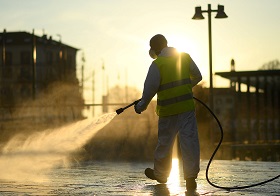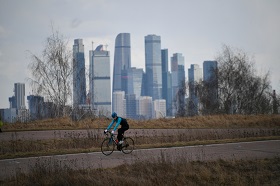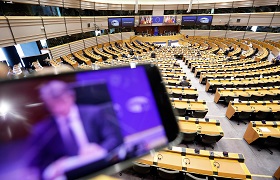For many experts and scientists, the events that are unfolding today are reminiscent of what happened in 2003, when the SARS virus presented the first large-scale threat to human health of the new millennium. Unlike today’s unbidden crowned guest, SARS was not so virulent, yet it caused major concerns for a number of countries, particularly in East and Southeast Asia. Hence the deadly lessons learned in Singapore (and partly in Taiwan), where the government has for two decades now been successfully using a system of mass surveillance of the everyday life of its citizens – a system that has received the approval of the people. This system is part of Singapore’s cybersecurity strategy and allows the physical condition of large masses of people to be monitored, thereby preventing diseases from spreading and escalating into epidemics. This, combined with their ability to enforce extremely strict quarantine measures and carry out mass testing instead of the selective testing currently practised in Europe and Russia, has allowed Singapore and Taiwan to contain the spread of the disease and prevent it from turning into an epidemic. Of course, their compact territories have certainly played a part here. Other countries, for instance, Israel and Russia, have already followed this example and approved a monitoring system that uses mobile data and geolocation in order to trace the movements of persons with confirmed infection. We have to assume that one of the first steps after the COVID-19 pandemic will be to embed this surveillance system even deeper into public life. Most likely, this step will be met with approval instead of protests and street rallies.
Will this represent a new social contract between the government, the public and the citizen? Probably. Will it represent a new pact between governments? One would hope so. Perhaps the coronavirus pandemic will break down the old world and give rise to the new one that so many expected to appear in the 1990s. But what was to await us back then was proxy wars and a confrontation through sanctions that split societies from within and raised barriers between states. Maybe this new world will be one where surveillance cameras and sensors will first prompt a feeling of relief and then become an integral part of the picture. Perhaps it will be a world where life without external surveillance and control will appear unsafe and unnatural.
“But isn’t this despairing god of yours mankind?”
Stanislaw Lem, Solaris
The insanity of despair and primaeval fear for one's health (and today, no matter how ironic and paradoxical it sounds, this may be the state of mind that brings many of us together) will most likely give rise to a new global formation that will then become a global reality. It is still hard to say what it will be like exactly, but it is clear that the world will become more transparent. And I do not mean in the usual sense of anti-corruption measures, but rather in the original sense of the word – the world will become more “see-through.” Our temperature will be monitored. Smartphones with built-in sensors will collect precise data not only about our clicks and likes, but about our physical and possibly emotional state. The world and the people that live in it will undergo a number of changes once the current coronavirus pandemic is over, and many of those changes will be accompanied by a leap in technological development.
For many experts and scientists, the events that are unfolding today are reminiscent of what happened in 2003, when the SARS virus presented the first large-scale threat to human health of the new millennium. Unlike today’s unbidden crowned guest, SARS was not so virulent, yet it caused major concerns for a number of countries, particularly in East and Southeast Asia. Hence the deadly lessons learned in Singapore and partly in Taiwan, where the government has for two decades now been successfully using a system of mass surveillance of the everyday life of its citizens – a system that has received the approval of the people. This system is part of Singapore’s cybersecurity strategy and allows the physical condition of large masses of people to be monitored, thereby preventing diseases from spreading and escalating into epidemics. This, combined with their ability to enforce extremely strict quarantine measures and carry out mass testing instead of the selective testing currently practised in Europe and Russia, has allowed Singapore and Taiwan to contain the spread of the disease and prevent it from turning into an epidemic. Of course, their compact territories have certainly played a part here. Other countries, for instance, Israel and Russia, have already followed this example and approved a monitoring system that uses mobile data and geolocation in order to trace the movements of persons with confirmed infection. We have to assume that one of the first steps after the COVID-19 pandemic will be to embed this surveillance system even deeper into the public life. Most likely, this step will be met with approval instead of protests and street rallies.
I would not wish to speak for everyone, but it seems to me that the choice between health and privacy is a no-brainer. The pandemic will end, and what the world emerging from the pandemic will look like is an interesting question worthy of discussion. To quote the Deputy Minister of Health of Iran, who had COVID-19, we can note that the coronavirus came to us from a relatively safe country and, contrary to recent rumours, it does not only affect those of Asian heritage: quite the opposite, it is very democratic in its choice of victims, which is to say, it affects everyone.
Hence the question: by self-isolating, we are buying doctors and scientists time to find a cure to the virus and test vaccines, but what are we going to do in the event of a new pandemic? Here, humanity faces two choices. The first is to give free rein to nationalists who are already jubilant and triumphant over the failures of globalization and the inability of liberal democratic countries to shut down their borders to viruses and undesirable immigrants. The second is to move to a radically new formation where we will become even more mutually dependent and open to our societies and governments, because this will be a mandatory condition for moving about and doing business, and perhaps even starting a family. Personal secrets will become a thing of the past, a fairy tale we tell our grandchildren. In fact, the issue is far more serious, with multiple additions and ensuing consequences.
Following the COVID-19 pandemic, consensus and mutual understanding between states will be relevant like never before, especially since the problems of disarmament, nuclear warheads, defence budgets propped up by taxpayer money, international sanctions, etc., that appeared and developed during the presidencies of Nikita Khrushchev and Ronald Reagan may finally move into the background. Instead, world leaders, especially given that most of them are at an age that makes them particularly vulnerable to the coronavirus, should start thinking about new plans for investing in healthcare, socioeconomic aspects of life and technological development, because those will be intrinsically linked with the other aspects of improving the state mentioned above. Will this represent a new social contract between the government, the public and the citizen? Probably. Will it represent a new pact between governments? One would hope so. Perhaps the coronavirus pandemic will break down the old world and give rise to the new one that so many expected to appear in the 1990s. But what was to await us back then was proxy wars and a confrontation through sanctions that split societies from within and raised barriers between states. Maybe this new world will be one where surveillance cameras and sensors will first prompt a feeling of relief and then become an integral part of the picture. Perhaps it will be a world where life without external surveillance and control will appear unsafe and unnatural.







